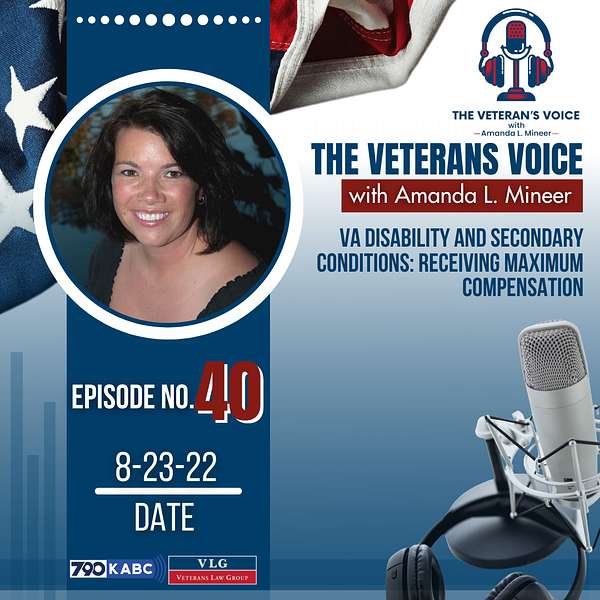
Veteran's Voice Podcast with Amanda Mineer
Veteran's Voice Podcast with Amanda Mineer
VA Disability and Secondary Conditions Receiving Maximum Compensation
For the 40th episode of The Veterans Voice, our host, Amanda Mineer, uncovers the “red tape” surrounding the VA and its benefits for veterans. Alongside various examples of real cases, Amanda touches on secondary conditions and how to receive an accurate rating and maximum compensation successfully.
To thoroughly analyze the VA and its benefits, Amanda begins this episode by briefly defining VA disability and secondary conditions:
VA disability is a tax-free monetary benefit paid to veterans with an injury, accident or mental condition determined to be service-related by the U.S. Department of Veterans Affairs.
A secondary condition, or a health problem linked to your qualifying service-related disability, is also a service-connected disability determined by the VA.
By connecting the definitions, Amanda explains how secondary conditions are often denied. This is because secondary conditions, or conditions that result from a predetermined injury or medication, are likely not disclosed while active duty, making it difficult to prove they are service-connected.
Amanda stresses that if you have a service-connected injury that leads to a secondary condition, it must be filed as a secondary condition.
To follow, we welcomed Lieutenant colonel Martin, a frequent caller from Orange County.
Martin starts by acknowledging the show and its help to thousands of veterans globally. Martin proceeds with various questions about claiming disability and disability ratings. With this, Amanda highlights specific cases and how the rating system was used to determine benefits.
Bringing a critical discussion to the table, Amanda digs into the infrastructure of the VA and what veterans can do to ensure their disability is correctly rated and compensated.
The rating system, Amanda stresses, often place veterans in a box of standards. With this, various conditions are rated based on the same criteria. However, mental conditions, for example, vastly differ–making the ratings inaccurate. So how can you ensure your diagnosis is correctly rated or corrected?
Amanda tackles this and more to ensure you are fully compensated for your service. Listen to the full episode for Amanda’s full advice and informative tips to learn more.
If you need help getting the VA disability benefits you deserve, you can request a free consultation here.
Amanda and the rest of the team will happily help you file a claim, appeal a decision, or help you get the benefits you're entitled to.